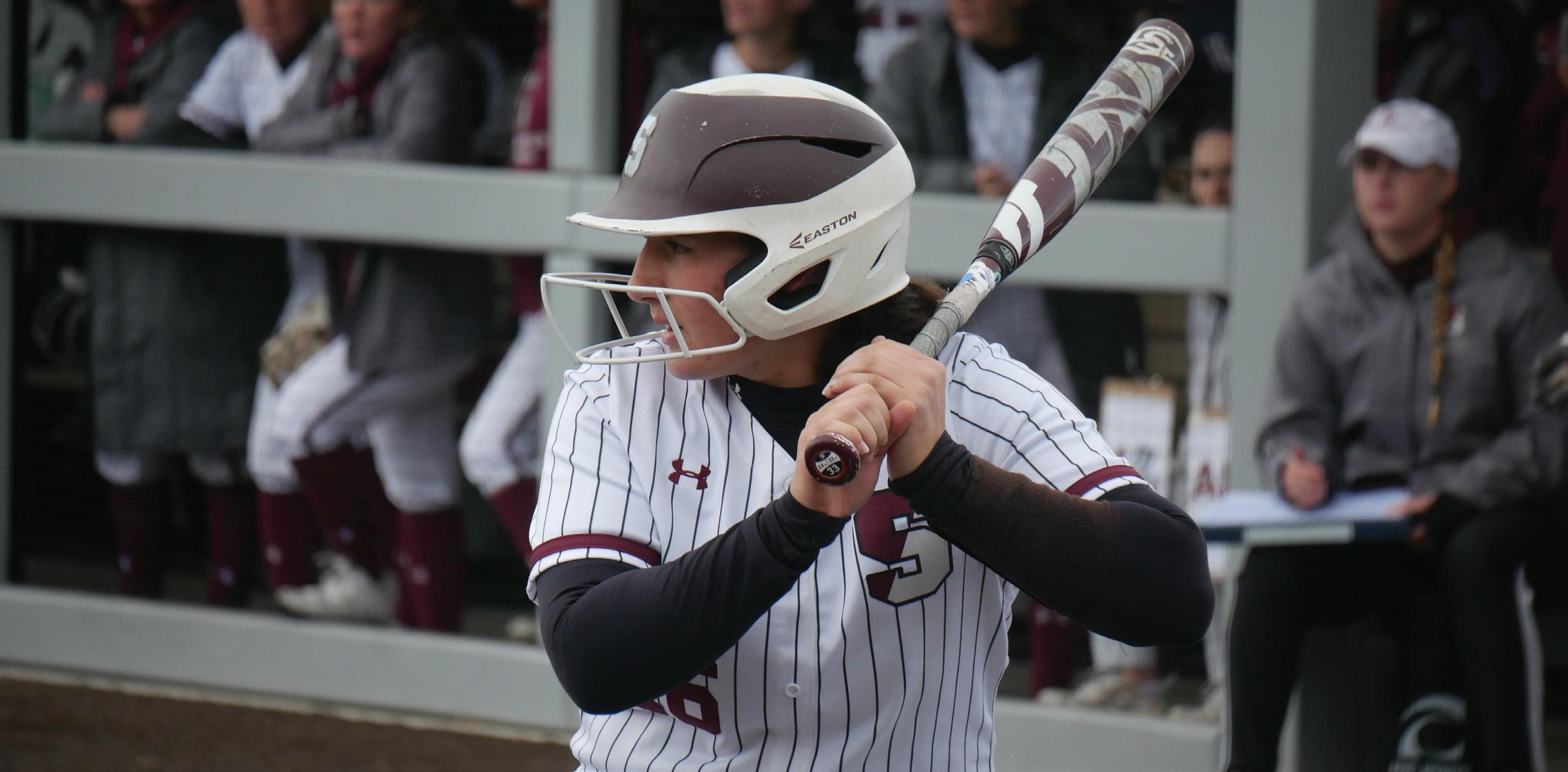The Springfield Student
Winners/Finalists for five Society of Professional Journalist (SPJ) awards in 2021

Winners/Finalists for five Society of Professional Journalist (SPJ) awards in 2021
After leaving her home country of Russia three years ago, Yana Garbuzova adapted to her new lifestyle at Springfield College and recently won the Math, Physics, and Computer Science Department’s Distinguished Senior Award.
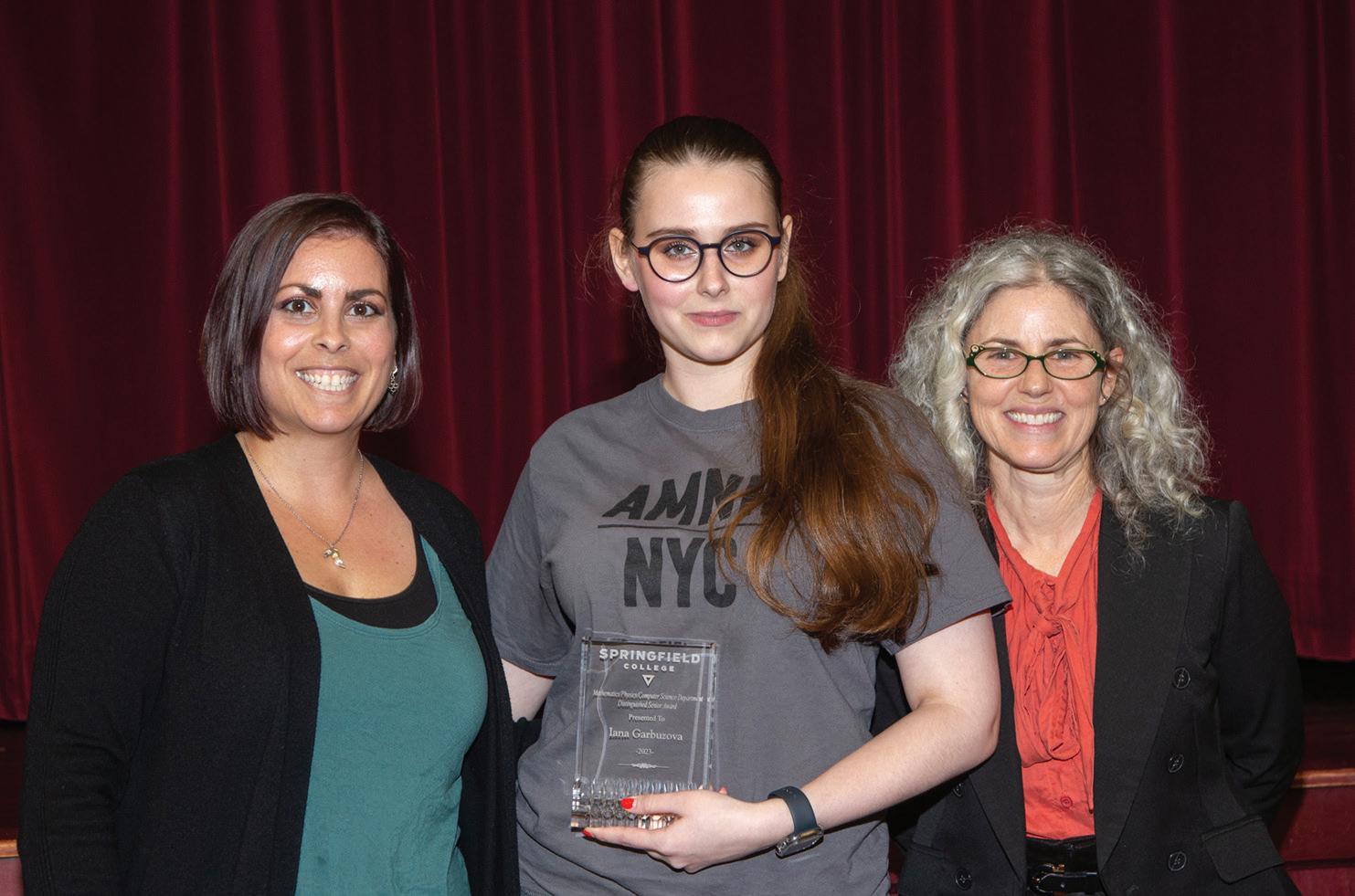
See page 6
PAge IX
Kathy Mangano reflects on her year as Distinguished Springfield Professor of Humanics
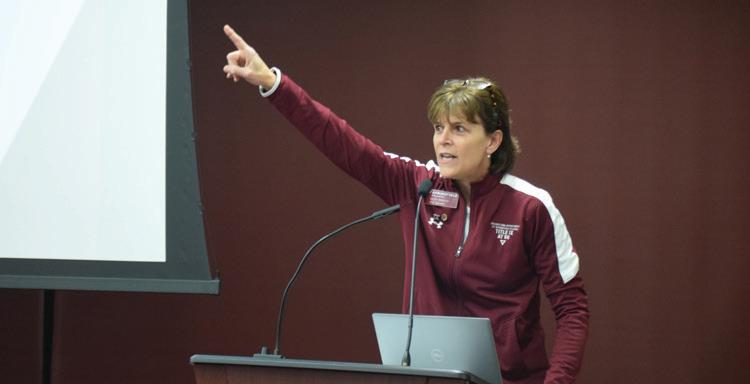
PAge 10
Eric Nicander’s path from Sweden to Springfield
PAge 13
Anik Dole: A little guy with a big impact on the track team
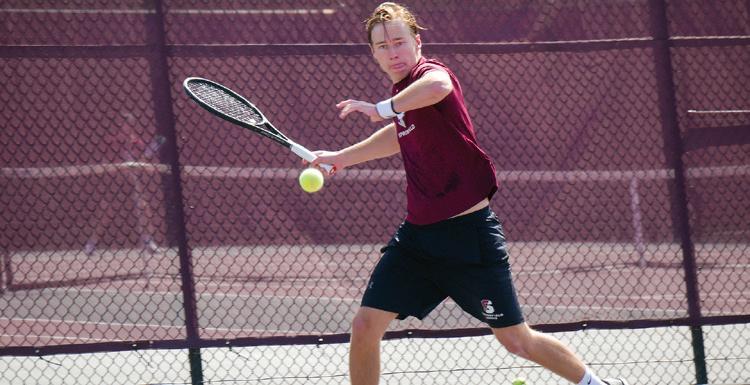

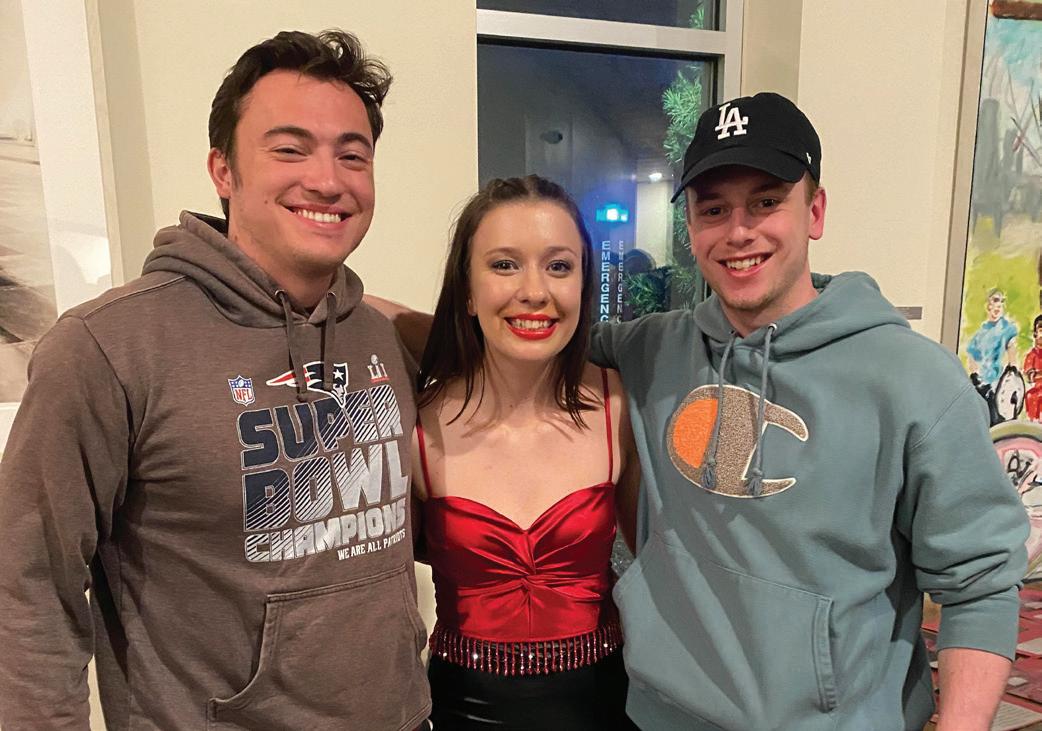 ___ By Carley Crain ___ @carley_crain12
___ By Carley Crain ___ @carley_crain12
Out of all the columns I have written for The Springfield Student, this might be the hardest one for me to complete. I have been staring at my computer screen for the past few days with a blank mind. How do I close this chapter of my life with one last column?
I’ll start by taking a stroll through memory lane. Coming in as a first-year student, I was so terrified of the newspaper office. I would walk down the stairs every week with knots in my stomach, hoping that my articles were good enough. Hoping that I was good enough.
I kept going, though, every week, even with cross country and track commitments. I started to really enjoy writing game stories, which was my journalistic focus at first. I was hyper-fixated on the idea of me becoming a sports journalist. But when we got sent home during my first year on campus, the priorities I had in life shifted. I started to care less and less about being a student-athlete at Springfield College, and more about my career as a journalist. I also found a place in the sociology world, and eventually, it became a second major.
When my advisor, Kyle Belanger, told me I could make my life easier by graduating early due to high school credits, I chose to ignore that and instead, I actually made things much more difficult: by adding a com-
pletely new major. During this time I also stopped running, which was a blessing in disguise. I dove deep into journalism after this, and there was no looking back.
But instead of reporting on just sports, I shifted my focus to writing about social issues, like racism and the LGBTQ+ community. I don’t plan on changing that anytime soon. I know that type of journalism is my calling. I have a voice and I’m not afraid to use it.
During my junior year, however, I almost quit the newspaper. I was incredibly close to throwing in the towel. I was tired of the almost daily sexist microaggressions, comments and feeling like everything I did was not good enough. The countless nights crying myself to sleep, anxiety attacks, calls to Kyle where I would be sobbing and the countless trips to my therapist Gary Enright’s office were becoming all-consuming.
But something inside of me kept going down to the damn office. That was such a hard time in my life, but looking back now, I am so proud of myself for sticking with it. I refused to let men control what I was passionate about.
When I got the call from Aimee that Chris and I were going to be CoEditors-in-Chief of Pride Sports Journal at the end of junior year, I was very confused, because we had never separated the
newspaper and magazine before. But I am so glad we did. Making the magazine much more of a team effort was one of the best things we did as a staff this year. And I am so proud of what we created. My experience at the newspaper and with Pride Sports Journal would not have been possible without some specific people, and I need to thank them.
Chris, you have been the best Co-EIC. We work so well together, and I appreciate everything you have done for the magazine this year. Your layout skills are incredible, and you should be so proud of yourself. I will miss annoying you next year. Also, thanks for coming to Vagina Monologues. You have no idea how much that meant to me.
Garrett, even though we have had some disagreements this year, I am so grateful that we have gotten to know each other during our four years at Springfield. You have made me feel like my voice matters and that what I have to say is important. I hope someday you can appreciate Taylor Swift for the queen that she is, however. Also, thank you for coming to Vagina Monologues. Having your support there means more than you know.
Cait, You have been my newspaper bestie all four years. I don’t think I could have done this without you. I very much enjoy our chats in the office and I look forward to it every week. Thank you for always supporting me. Love you!
Marty, I can’t thank
you enough for all of your support over the years. I would not be the journalist and person I am today without you. I always think back to your Introduction to Journalism class, where I wrote my first feature on Arielle Johnson. That class and story changed my life. I will miss you so much next year!
Irene, Thank you for sticking by my side during our shared time at Springfield. I will always remember when you stood up for me after the whole Deshawn Watson fiasco last year. That meant so much to me.
Kyle, I have absolutely no idea what I would have done without you at Springfield. You have always been my biggest cheerleader on campus, and we have become so close. I know I can always come to you with any issue or problem I am having. Thanks for the phone calls when I would be sobbing, office visits and always reading all of the content I have created. Your support means so
much to me and is something I will cherish forever. Also, I will be sending you Era’s Tour content, so be prepared.
Aimee, Having such a strong female presence in the office this year because of you has been incredible. I feel so seen, heard, and valued with you in the office. I am so grateful that I have been able to learn from you. We will have to recap the Era’s Tour over the summer via text post-graduation!
And to the rest of the staff, thank you for all of your contributions to campus media this year. Please recruit more women next year, though, and make sure to report on nonsports content!
Outside of the newspaper staff, I have the best support system at work, home, school and my family. Thank you all for everything.
So that is my sappy, farewell column. Much love!
Oh wait, I can’t end without a Taylor Swift quote: “Long story short, I survived.”
Sometimes, you’re just filling pages. They’re not all gonna be Pulitzer Prize winners, I’m sorry to say. We got a front and back cover and 14 pages to fill in between at The Springfield Student, and I’ve been assigned to put my silly words on one of them.
***
It was one of the first times I was in the newspaper office when Springfield Student Assistant Sports Editor Joe Arruda told me I was on the baseball beat for that year. It was pretty funny considering I was cut from that team in an attempt to walk on just five months prior, but I don’t think many people outside the team or the second floor of Massasoit Hall knew about that.
My tryout process was easy to miss, since it took four days of fall season for me to get the boot. I wouldn’t have blamed head coach Mark Simeone if he did not remember me when I stepped on to Archie Allen Field to interview him.
Whether or not he did, we grew more familiar with each other, but not in the way I initially planned. I grew to appreciate getting cut more over time, since sports writing was surely going to be a larger part of my future than playing. ***
After a lot of work improving my baseball skill that resulted in about 20 pounds gained, 165
pounds added to my max deadlift and my fastball being increased by eight miles per hour, I failed to hit my summer velocity goal heading into my junior year here, and determined I needed to prioritize my focus on things that would reward me more.
The main idea of that was my potential career in sports journalism, which started with The Springfield Student.
I had been appointed Co-Sports Editor, but barely had experience covering sports thanks to everyone’s favorite virus. That quickly changed in my junior year.
Through consistent game stories on the women’s volleyball, men’s basketball and baseball teams, weekly print articles, Hoophall stories and a Pride Sports Journal feature, I put together 64 articles in the 2021-22 academic year, while also contributing to the newspaper layout each week. The Springfield Student, and sports media in general, became the new thing for me to put my heart into.
It was definitely necessary. I certainly did not come into the paper overwhelmingly talented. Yet, The Springfield Student allowed me to grow. I was allowed to write a lot of okay articles before learning how to write good ones, and you do not get that everywhere.
And most of what I
have learned about good writing and journalism has been through experience, advisors and especially through fellow students at this publication.
Joe Arruda, you were the one badgering me about sending live tweets for Springfield baseball games only three years ago. I would watch you rightfully rip my game stories to shreds in real time through a Google Doc, and I ultimately learned a lot about the journalistic process through observing you. You set a high bar for Springfield sports coverage.
Garrett Cote, I went from barely knowing you prior to this fall to growing a solid kinship with you for our senior year. You got a lot of praise after Hoophall in our junior year, so I dug into your work a little more, and really took influence on scene-setting and ledes. It’s been a pleasure sharing layout headaches with you in both newspaper and PSJ.
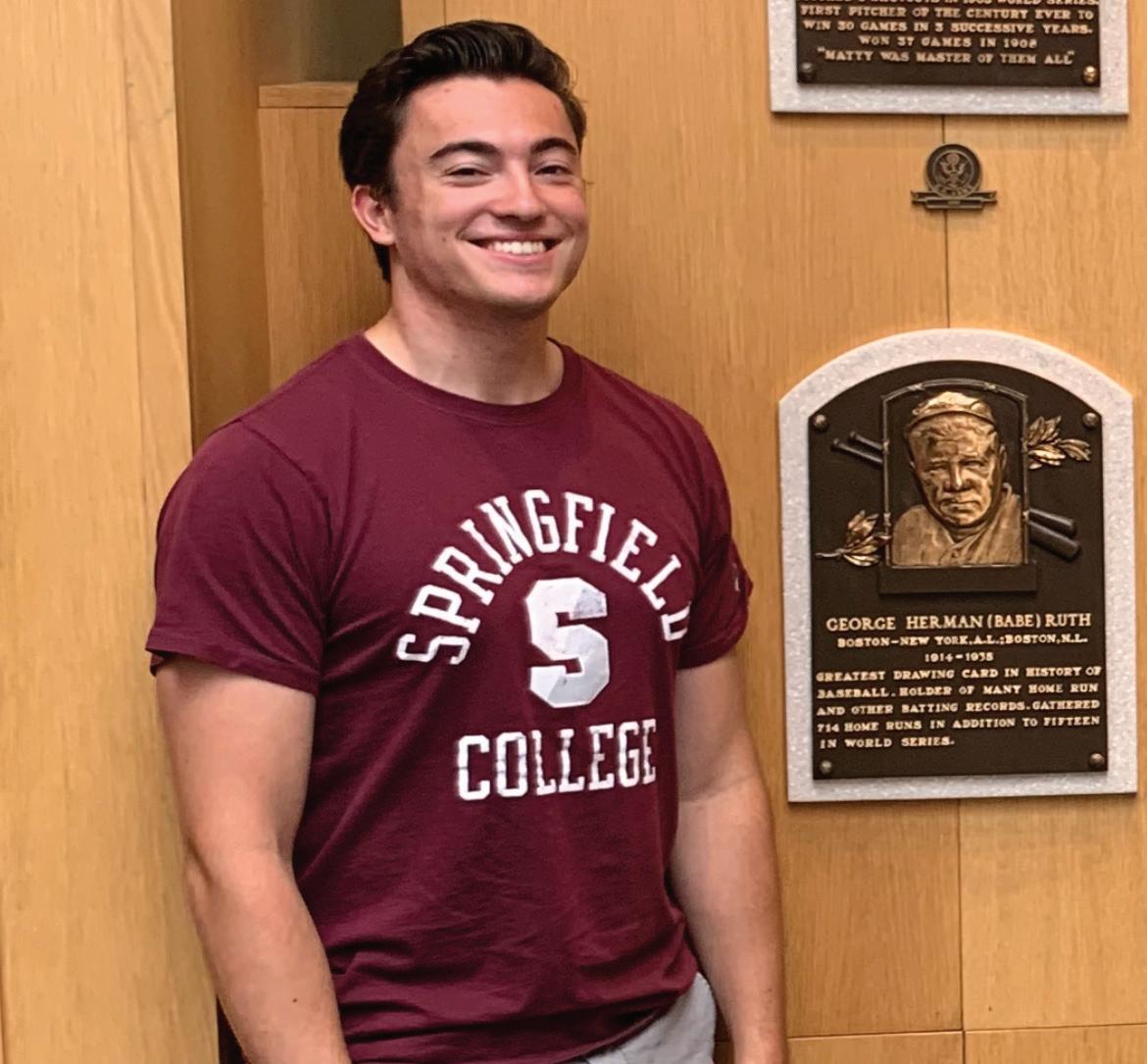
Carley Crain and Cait Kemp, I am always impressed with your abilities to do things I am not good at-whether it be writing great news stories, columns, articles on sensitive topics or a variety of other things. Getting to know you both from COMM101 to now has been an amazing experience, and I am excited for what you both have in store.
Marty Dobrow, you politely persisted me into joining the newspaper, so I owe you a “thank you.” I am not someone who naturally puts himself out there. You identified that I needed a push (or two), and without that, things may look different for me.
Aimee Crawford, I have absorbed an abundance of knowledge on the intricacies of writing just from you fixing my subheadlines for layout, never mind the consistent editing on my stories-especially with my upcoming PSJ piece. You are everything we could ask for in an advisor and more. You do everything you can for us, and that will never get lost on me. If my future bosses are half as good as
you are an advisor, I will be very lucky.
I would be remiss if I didn’t give a shout to the people who are the current and future of this newspaper: Braedan Shea, Luke Whitehouse, Sean Savage, Patrick Fergus, River Mitchell, Nick Pantages, Tucker Paquette, Corey Raftery and Liam Reilly, who made this year much easier. Only Braedan had written with us before this year, and it’s been a pleasure having you all contribute quality work while making the office a fun time, too.
I am surely over my word limit now, so I apologize to this story’s layout designer. Just use size-11 font and spacing, and make my picture smaller.
Kemp’s path to discovering her place at Springfield.
@caitlinkemp09I hate change.
Ever since I was a little girl, anything that had to do with changing a normal tradition or occurrence in my life really bothered me. It’s never been the little things, like daily tasks or keeping a specific schedule every day. For example, when my family decided to switch from going to Narragansett every summer to Hampton Beach, I freaked out. I remember crying in the car when my mom mentioned it, completely upset that something that big in our lives was going to be different.
Unfortunately I’ve always been like this and still am today. As you can imagine, adapting to college was very hard for me. I knew it would be difficult, I said it every day leading up to when I finally left for preseason. I was going to hate it and I would not have an easy time with such a drastic life change.
Ding ding ding! You guessed it, I was miserable (at least I’m selfaware). I cried every
day of preseason, after practicing for hours in the close-to 100-degree heat. I wasn’t super close with anyone and it was hard to make friends when every day after our busy schedule I just wanted to shower and go straight to sleep.
It took me almost the entire first semester to finally not hate college. I stopped crying on Sunday when my mom would drive me back to campus after yet another weekend home – I stopped going home every weekend in general. I finally liked where I was, what I was doing and who was around me.
Now, after becoming so attached to Springfield College and the people I have met here, I once again have to be ripped away from my norm and experience change. Instead of crying about having to come back, I am crying over leaving. It makes me regret all the weekends I went home instead of staying here with my friends and the days I wished college away, waiting for it to
be summer again. It’s so cliche, because everyone does it and everyone then feels exactly like this when it’s finally coming to an end. However, I know the change will bother me more than I wish it did.
Leaving behind what I’ve built here – the friendships, the community, the work that I have done – is something that really does make me sad. Coming in as a freshman just trying to get through the week to now wishing the days were so much longer proves that I have come a long way.
Thinking about my journey I can’t help but focus on my journey specifically as a journalist at Springfield Col-
lege. When I think back to my writing and what I did for the Student my first year compared to now, I can truthfully say that I am proud of myself and my growth. I am even more proud of the growth of the people around me and the opportunity I have had to watch others discover their own voices within their writing.
To the group of writers we had this year, it was such a blessing to have you all on the staff. After struggling to assign stories in past years and scrambling to fill pages, it was relieving to know we had the great staff behind us each week to produce amazing work.
To the staff editors
this year: Braedan and Luke. Getting to work with you this year was way too much fun. I feel like we got so much closer as a staff and as friends and that made the long Wednesday nights so much easier. I am so proud of each of you and how hard you have worked this year. I know The Student is in good hands in the future.
Chris Gionta – intramural softball MVP. I have enjoyed working with you this year, at both the Student and MassLive. Your quiet and calm demeanor but quick sense of humor is so fun to be around and I appreciate your
Clout continued on Page 8

There were several times back in the fall I honestly didn’t think I would make it to this point.
The stress swarmed me every day. The stress of the unknown (what’s next in life), the stress of the present (classes, internship, being CoEIC of the newspaper) and the pressure of doing it all to perfection.
But here I am, ready to say goodbye.
This week’s paper is the 25th and final one of the year, matching our total from a year ago. We produced over 40 stories at the 2023 Spalding Hoophall Classic in January, and the 15th edition of Pride Sports Journal is on its way.
Through the stress and burnout, this year has been a success. We accomplished everything we set out to do.
In the past, these columns have been about the person writing them. But my short time as a part of this newspaper has only been as successful and fun as it’s been because of the people around me. So, this is for them.
I have no choice but to thank Joe Arruda. He believed in me from the first time I walked into the newspaper office, and continued to push me to lean fully into the journalism world. If it weren’t for him, I would never have gotten the opportunity to be CoEditor-in-Chief – like, actually, because he had to advocate hard for me after I botched the interview – and I would not be as strong of a reporter as I am now without your guidance. Thank you.
To those who will be carrying on the legacy and tradition of The
Springfield Student, I have the utmost confidence in you to improve on everything we’ve accomplished this year.
Luke, you have been an absolute joy to work with. Watching your growth over the course of the year has made me proud – even though you prioritize a conversation you aren’t a part of over doing layout. But seriously, I can’t wait to see what next year brings.
To all of you rising sophomores – Corey, Liam, Nick, Patrick, River and Tucker – plus Sean, when you finally learn to get your stories
in on time and conduct interviews in person, you guys have bright futures ahead of you. Solemnly, though, we would most certainly not be in the position we are without your contributions this year. Coming into the year with just five or six people on staff, we needed people to step up, and step up you did. Thank you.
Braedan, my guy. Having you around fulltime this year has been extremely helpful. We share a lot of the same passions and possess a similar sense of humor. Because of this, we-
get absolutely nothing done when we’re next to one another in the office. You’ve been the backbone of our sports coverage this year, and I appreciate everything you bring to the table –even if it’s vegan.
My fellow seniors –Carley, Chris and Caitlin.
Carley, if it weren’t for you, I don’t think our coverage of the campus would have been as versatile and unique as it was this year. Your open mind and spirited personality have allowed us to broaden our scope to incorporate all kinds of groups at Springfield. Yes, we have had our fair share of arguments, but you’ve inspired me to become a better person and better friend – and I will forever appreciate you for that.
One of my favorite parts of this year has been the development of my friendship with Chris. Gionta, you are hands down the most un-funny funniest person I’ve ever met. You’ve kept me sane this year, no question about
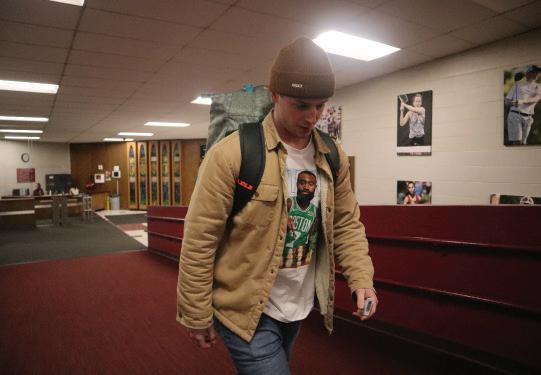
Three years ago, senior Yana Garbuzova took a leap of faith and left her home country of Russia to attend Springfield College. Now, she is set to graduate with a degree in Computer Science, and has become an activist against the Russian government.
Computer science is exactly what Garbuzova is pursuing in her time as an undergraduate, and plans to continue to graduate school to delve into software engineering, or perhaps further expand her interest in artificial intelligence.
@samantha_alexxMillions of lives would change with the Russian invasion of Ukraine. Families would be torn apart, forced to flee their homes, and many would lose their loved ones. Millions of refugees would try to make the journey to the western side of the country, some not entirely sure where they were going. They just knew they had to escape the violence while they still could.
Right here on Alden Street, Yana Garbuzova, an international student from Russia, was feeling the stress of the conflict more deeply than anyone else on campus.
She worried about her friends and family, who lived between the Russian military sta-
tion and the Ukrainian border. With each day that passed, she had no idea when she would hear from them next, or even if they were safe. With each call she made home, she could hear the helicopters and missiles flying back and forth over her town.
Unfortunately, all she could do was watch the news from 5,403 miles away.
Three years ago, when Garbuzova was deciding where she would attend college, she immediately began researching institutions in Europe and the United States. Even as a teenager, Garbuzova knew that her small hometown of Slavyansk-on-Kuban, in the Krasnodar Region
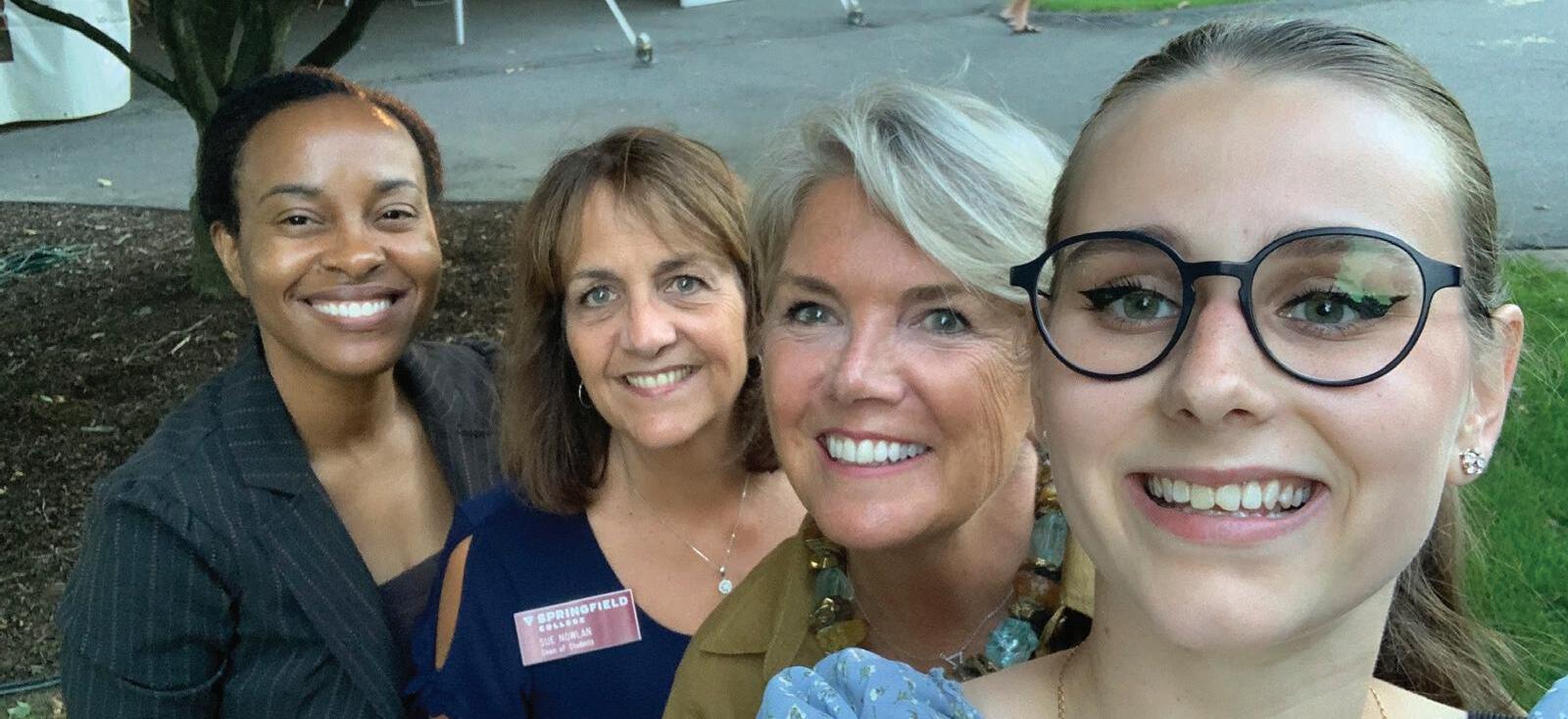
of Russia, did not offer the opportunities she was after.
Unlike most Springfield College students, who come from high schools within nearby cities or even states, Garbuzova was making the move across the world to further her education. She also did so with her name mispelled as “Iana,” as the government provided her with a mistranslated passport.
“Do you know the Iron Man movie?” Garbuzova asked, smiling.
“I watched the first one, then I became obsessed with computer science, and that’s actually why I applied to [colleges in] Massachusetts state, because Tony Stark was a graduate student of
“[Yana] is a phenomenal student,” said Heather St. Germaine, director of Springfield College’s International Center. “I don’t think she’s ever received anything below an A, and always been just very driven and committed to following her dreams, and that was to come here and graduate from Springfield College. So much so that she has accelerated that process and plans to actually complete a year early.”
Beyond the classroom, Garbuzova keeps herself busy working four different jobs on campus. She is a student assistant in both the Computer Science and Literature, Writing, and Journalism departments, in addition to working at the post office and as a resident assistant in International Hall.
She often comes across as reserved to others, but Garbuzova’s personality can fill a room. She loves spending time on her
PlayStation and is currently rewatching “The Last of Us,” a television adaptation of her favorite video game. She also loves sushi and has taught herself how to make the dish by watching YouTube videos. What she describes as an obsession has now also piqued her interest in Japanese culture. When asked about her other pastimes, Garbuzova turned her hands over and wiggled her fingers, smiling. She answered simply, saying, “Nails.”
Garbuzova painted her fingernails a dark navy blue, so deep of a shade that they are almost black. She had also painted colorful specks across them, somewhat replicating a dark night sky and the stars.
“It’s the same as painting,” she says. “If I have free time, I just do my nails.”
Like any other college student, Garbuzova is hardworking and simultaneously pursuing a handful of interests. However, what most people don’t see is the ongoing struggle of keeping her mind off of the conflict at home.
“Whenever I call my mom and she does not answer me, it’s really tough,” Garbuzova said, nodding gravely. Her
voice went quiet, far from the lively tone she possessed when talking about her major and her work. She calls home as often as possible, just because she does not know when she may get another opportunity to do so.
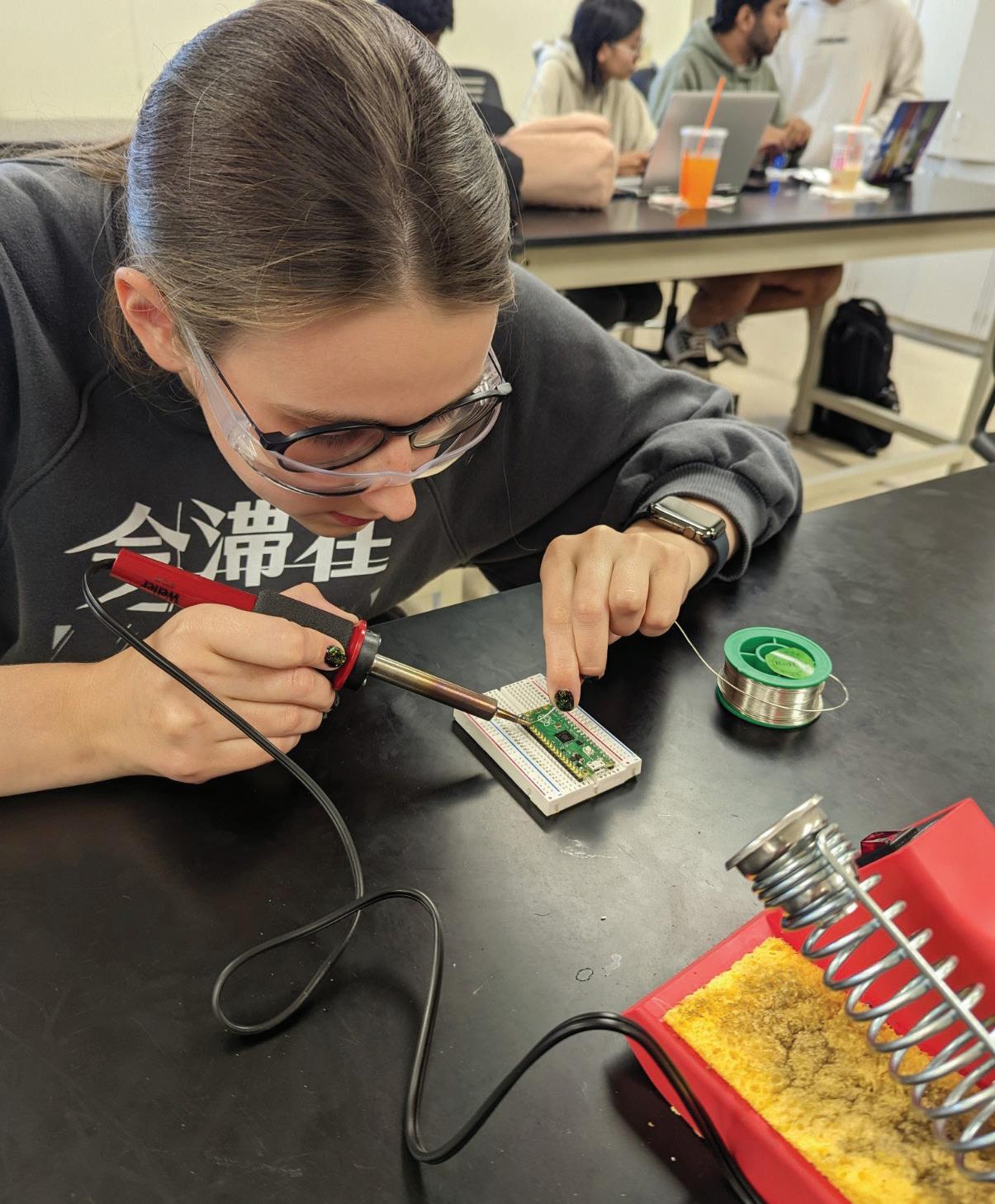
Garbuzova’s grandmother was born in Ukraine, and she has had family in both countries since the war began last winter, which makes the conflict all the more complicated. Still, she finds time to spread knowledge about the Ukrainian situation, and even helped her uncle find his footing in the United States after he left Russia.
“On top of all her school pressures, she helped him get a Social Security number, she helped him get a job, an apartment, and later helped his daughter do the same. We did a fundraiser where we tried to get clothes and food for them to get up on their feet and running,” said Kellie Lavoie of Springfield College’s
Computer Science Department. Lavoie works closely with Garbuzova through her work-study program, but has also become a kind of mother figure for her while she is at school. “She doesn’t just worry about herself, she worries about her family.”
Even though she is Russian, Garbuzova has made it extraordinarily clear where she stands on issues of the war. Since arriving in Springfield, she has written several essays and social media posts about her support for Alexei Navalny, a leader of the Russian political opposition, and criticisms of his imprisonment.
“I was actually… friends with the coordinator, one of Navalny’s places in Kaliningrad. I was not famous, but I was emphasizing my opinion,” Garbuzova said. “We have to talk about this, about the war. I feel like I’m responsible to talk about this, sharing my opinion, sharing the knowl-
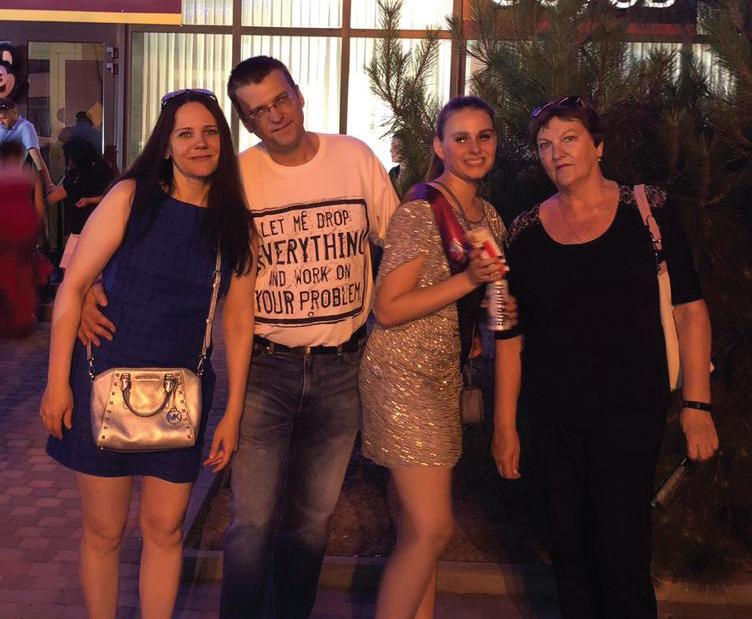
edge with the people.
Garbuzova also frequently encourages people to volunteer or find other ways to support the Ukrainain people. One of the ways she has done this is in partnership with the Office of Spiritual Life to commemorate and speak about the Russian Invasion of Ukraine. “I do believe taht Ukraine will win and recover; and I will do anything to make this happen,” she said.
With the ongoing war, Garbuzova being able to return to Russia after graduation is highly improbable. Unfortunately, her political alignment makes this even more unlikely.
Garbuzova will presumably never return to Russia to see her family. Her activism and writing have caught the attention of the Russian government, and she could be arrested if she returns to the country. Her family could even face repercussions on her behalf, so they may move to Germany with family friends to escape this and the fighting. Sadly, Garbuzova ultimately does not know what will come of their situation.
“It’s stressful. You know, some days, she’ll sit here and cry, because it’s a lot of burden on a young person’s shoulders,” Lavoie said. She has seen Garbuzova’s growth as a student and person, but has also seen the immense toll that the Russia-Ukraine conflict has taken on her mentally.
Thankfully, Lavoie is a central piece of the strong support system that Garbuzova needs and has built at Springfield. Donna Laviolette, an academic associate of Springfield’s Literature, Writing, and Journalism Department, is another one vital part of Garbuzova’s experience here. It’s relationships like these that help her navigate her time at a college so far away from home.
“I have no doubt that she will succeed,” Laviolette said. She has great hopes for Garbuzova after she leaves Springfield, chief of them being her happiness and reaching the goals she has set for herself during her time in undergrad. Laviolette spoke of Garbuzova approaching graduation
with tears welling in her eyes.
“I’m sure that Springfield College will be proud of her when she does succeed and she’s going to make a little name for herself,” she said “She’s not the average student here. I feel like it’s been a definite pleasure and honor on my end, being able to work with her.”
Garbuzova says that the Springfield College community is filled with hundreds of other friendly faces and helping hands, which has made her hard days a lot easier. Despite the great amount of uncertainty and stress that follows her, Garbuzova said, “They all supported me, they all understand me. so it’s a lot about people here, and people here are really, really, good.”
Clout
continued from Page 5
extremely well-timed jokes. Your hard work, especially in this final stretch with PSJ, was just insane and I commend you for your efforts.
In a major and profession that is so male-dominated, I have been grateful to have Carley on this journey with me and I appreciate the friendship we have had these past four years. You are so passionate and it is what makes you shine as a writer and simply as a person. I know you will take your strong voice and love for telling important stories with you wherever you go moving forward.
Garrett, my Co-Edi-
Cote
continued from Page 6
it. From our frustrating and stress-filled late nights with Pride Sports Journal (white space) to being the last one in the office with me every single Wednesday, you’ve been just as much of an EIC as anyone this year. There isn’t a doubt in my mind that you are going to succeed in this field. Thank you.
And you, Ms. Clout Kemp. I think our relationship could best be described as brother and sister. We annoy the hell out of each other, but there’s nobody I’d want to annoy me more than you. I’m not sure how you managed to balance being a student-athlete (which you’d make sure
tor-in-Chief, it has been a pleasure to lead alongside you and watch you flourish in this role. I am impressed every day by your admirable writing and storytelling and I am glad I have been able to learn from you along the way. You have pushed me to strive to be better, and that is the best thing you could have done for me. Marty Dobrow! My beloved advisor. I will never forget you telling me that you saw something in me, back in 2019 at June orientation, before you had ever even read any of my writing. That instant confidence you had in me meant so much and it gave me the boost I needed to get involved and start my writing
everyone in the office knows you are), having an internship, taking classes and also managing Co-EIC duties. You’re very driven and terrific at what you do. Thank you for driving me crazy all year long.
To the man who got my foot in the door – my advisor, Marty. I remember our first meeting like it was yesterday – your wisdom and experience drew me in. Even though it was over Zoom, I could feel that I was in the right place. When I switched into COSJ as a sophomore, smack in the midst of COVID, I had no clue what to expect. You soon took me under your wing and pretty much developed every single skill I have now.
experience here. And most importantly, thank you Aimee Crawford. You have been like my school mom, and all the journalism stuff aside, I am so thankful to have had you at Springfield the past two years. I am grateful to have not only learned so much from you, but to simply know you. I cannot thank you enough. A quick special thanks to my friends. I wouldn’t be here without the amazing people I have met at Springfield College, as well as my best friends from home who continue to support me from afar. My family is my greatest support system, so one final thank you to my parents and brother.
Everybody says you learn journalistic skills by doing it – which, to some degree, is true. But I learned a great deal from your classes, and I know I wouldn’t be the writer I am today without you. It’s been great growing closer and closer to you as our time together comes to an end.
And lastly, I want to thank quite literally the best human being on this campus, Aimee Crawford. Aimee, you have been nothing short of incredible (and yes, I’m using the word incredible) this year. Chris and I always joke that if you did even half of what you do for us, we’d still think you’re amazing – that’s how much you help our club.
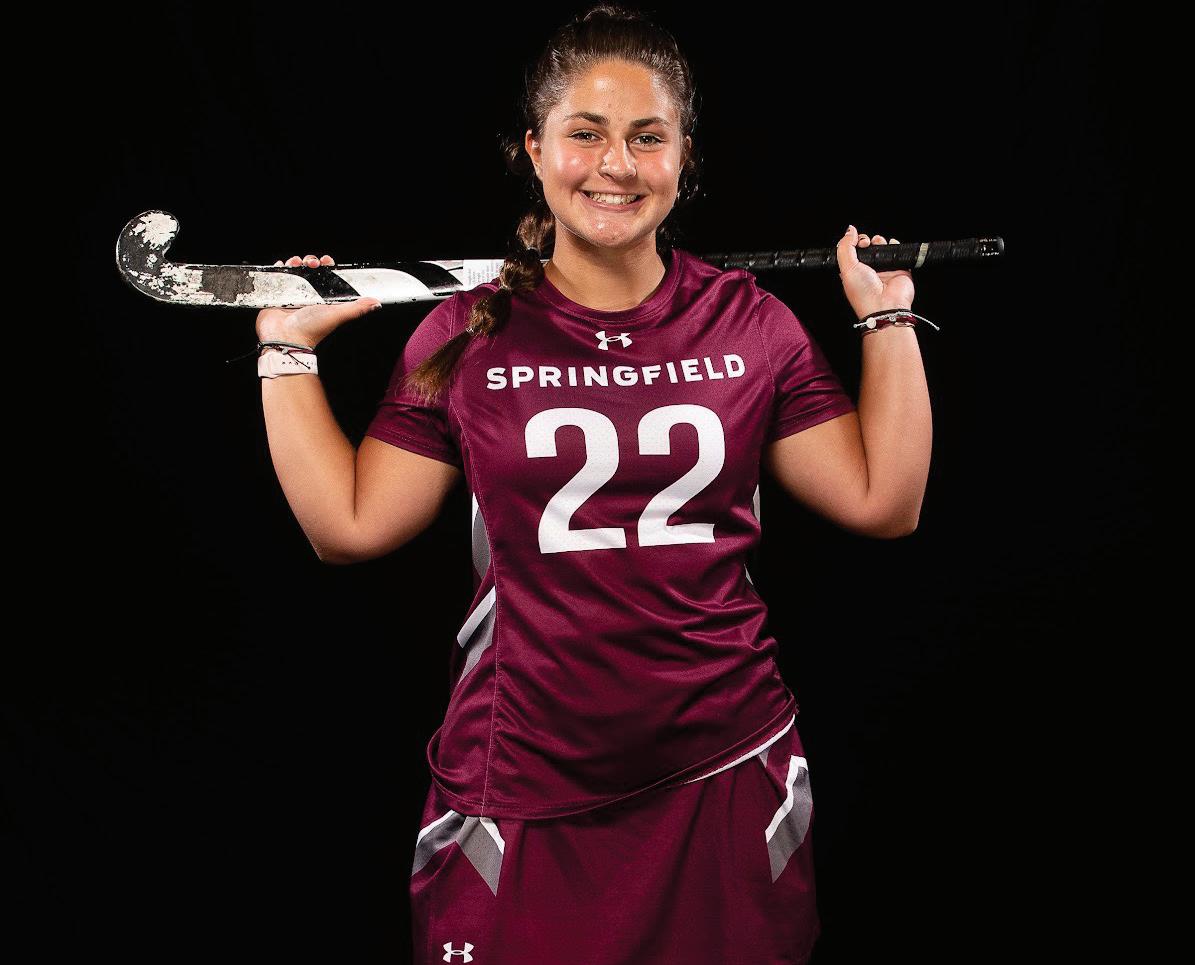
Without you I would be nothing.
Change sucks, especially leaving behind something as wonderful as this, but unfortunately I have to encounter it. My high school senior
It’s not often you get to learn from one of the best, hands-on and up close, but I get to do that every single day. You’ve helped me grow as not just a journalist, but a man, and I cannot thank you enough for that. Words are what we do but I still can’t find enough to describe what you’ve meant to me over the past two years. Thank you, thank you, thank you.

quote comes to mind, and works perfectly once again in this season of change: “Whether or not you face the future, it happens.” -Duckie, Pretty in Pink, 1986.
Although it is sad having to say goodbye to The Springfield Student, I am absolutely thrilled that I’ll never have to listen to Taylor Swift again. (Sorry, Carley.)
This year has been hard, and I still have no clue what I’m doing after I graduate, but I know that because of all of you, I am well equipped for whatever comes next.
On May 15, 2022, as the country prepared to celebrate the 50th anniversary on June 23 of President Richard Nixon’s signing of Title IX of the Education Amendments of 1972, Billie Jean King took the stage to deliver our 136th commencement address. This event kicked off Celebrating Opportunity: 50 years of Title IX at Springfield College.
This legislation greatly impacted my life and career. It seemed fitting to focus my Humanics project on the civil rights law that provides access and equality in education to all. On Aug. 9, I shared my Humanics project, Title IX at 50: Educate & Advocate, with our community.
During my first campus visit over 40 years ago, I gravitated to our Humanics philosophy. The College seal; the triangle; spirit, mind, and body; the lamp of knowledge; and the circle that encloses the triangle – symbolizing balance – are the building blocks of our Humanics mission. In the first Humanics lecture in 1967, Seth Arsenian said, “The meaning of Humanics cannot stay static,” and must be “ tested out in action.” For me, the words “in action” were key.
I was 8 when Title IX passed. I didn’t then appreciate what trailblazers did to improve inequities facing girls and women. And in this anniversary year, I realized how much I didn’t know. So, I spent the year taking action to educate and advocate to preserve and strengthen this law, encouraging others to do the same.
The Title IX Commemoration Steering Committee, the Office of Non-Discrimination Initiatives, and pioneers Mimi Murray, Diane Potter, Jone Bush, Dottie Zenaty, Branwen Smith-King, Donna Lopiano and Shawn Ladda were instrumental in educating through their participation in programming offered this year.
A diverse group of individuals agreed to be interviewed for webcasts that we dropped on the ninth day of each month. They answered questions, shared personal stories, and gave advice on securing Title IX, reaching more than 1,560 viewers.
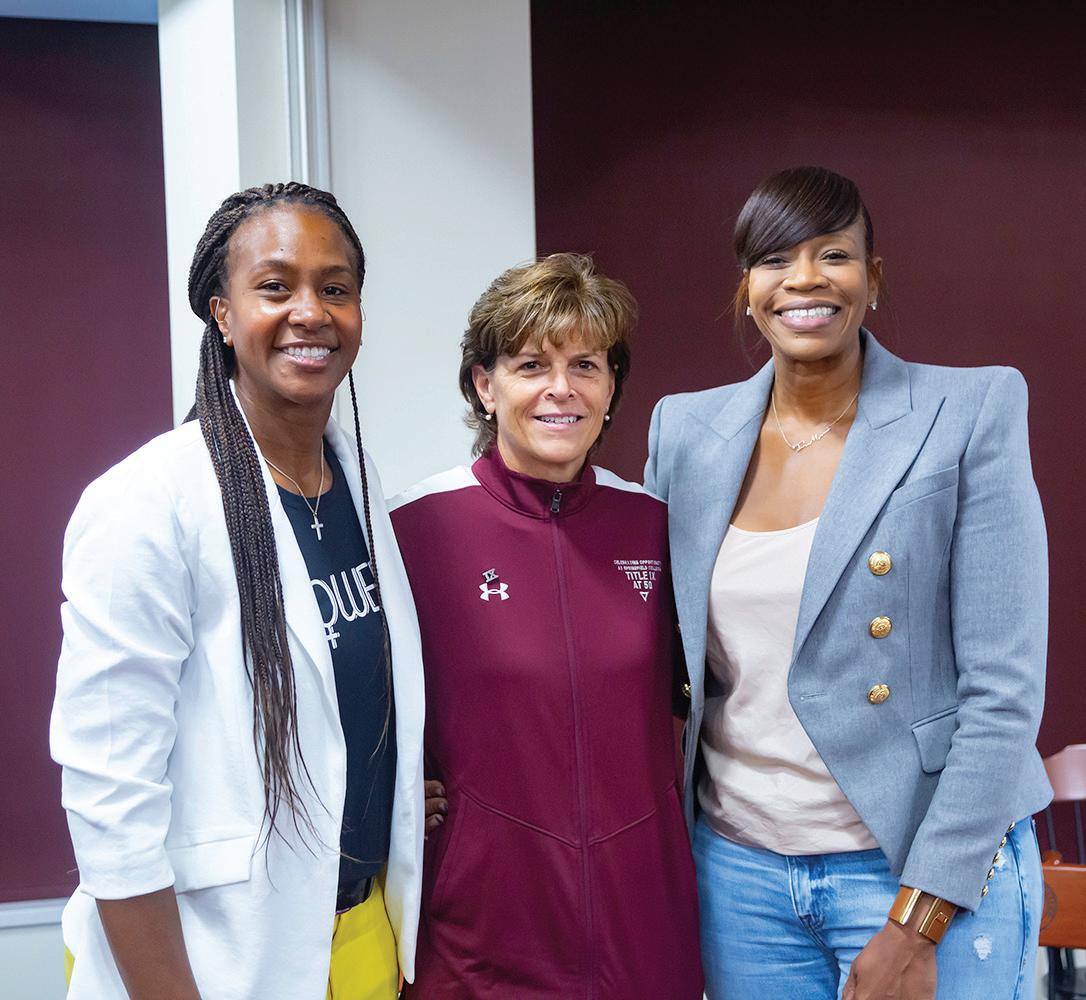
Title IX celebratory events included 9/9 for Title IX: The History of Women’s Basketball Day, and featured now-Governor Maura Healey. The Sporting Woman: Insights from Her Past exhibit in the Wellness Center, and the Celebrating Title IX at 50 display in the Learning
Commons provided historical reference. Reading trail signs, and Title IX cab rides where we drove people around campus while asking Title IX questions for prizes rounded out the activities.
Two powerful events were the Students Against Violence Everywhere “Take Back the Night,” and the Women’s Forum sponsored by the Women of Power, the Student Society for Bridging Diversity, and the Men of Excellence. These featured stories from students who are taking action to make a difference.
Our Title IX social media channels and The Springfield Student newspaper were two active “educating and advocating” voices, for which I am thankful. Celebrating Title IX was part of many School of PEPSL lectures. The Sports and Social Justice Symposium spotlighted Cathie Schweitzer, our first female athletic director. And, Title IX: Across the Professions featured a panel of cross-generational alumnae discussing how Title IX provided pathways into careers in male-dominated fields.
On February 9, students, faculty, and staff shared their advocacy projects to help educate, secure, and/or strengthen Title IX at the Title IX
Advocacy in Action event. Through reflection papers, they shared how what they learned relates to Humanics.
We must remain vigilant, taking action to ensure inclusive practices and engaging in speech that leads toward justice, beyond our campus community and within it. We must embrace an inclusive culture, appreciate others, and invite the dissent that preserves our distinctive Humanics philosophy, in spite of fear. We must also elect, employ, and hold accountable decision makers who support equity; and direct resources needed to hold schools and districts in compliance.
Title IX successes are plentiful. There is greater access to educational opportunities and careers and professions that previously were gender stereotyped. There are improved policies to help sexual harassment and assault survivors. Pregnant and parenting students can stay in school.
There are greater protections for queer and transgender students. There is increased access to athletic opportunities.
Every presidential administration since 1972 has tried to bend the law to align with their ideology. Moving forward, public policy must help secure and maintain rights of all individuals, and advocates vigilant in their actions. We should be grateful to pioneers who initiated this journey for equality, but there are still battles to fight. In the next 50 years, we will lean on younger activists to carry the torch of equity and justice forward.
My gratitude to those who provided me with guidance, support, and assistance. I especially want to thank my friends and family.
Best wishes to my dear colleague, Miguel Arce, the 2023-2024 Distinguished Professor of Humanics. I look forward to his exciting year!
holm, Nicander has been playing tennis for as long as he can remember.
Adjacent to the big white dome that is Blake Arena exists a four-bytwo set of tennis courts that hosts the most diverse group on campus.
On one court, someone from the island nation of St. Lucia can be seen serving to someone from Thailand and a doubles match with an American and a Chinese player competing against an American born in Russia and a Mexican born in Spain. On the last court there is a group of Swedish kids working on their backhands. One of these Swedish players is Eric Nicander. Nicander embodies the American stereotype of Scandinavian people; he has the tall, lanky stature completed with blonde hair and light eyes.
The tennis team has gained the reputation of being the international hub of the campus. The team has players born in seven different countries spanning North America, Europe and Asia, including a trifecta of first-year players from Sweden. Nicander is joined by Mateusz Czajka and Tim Norin.
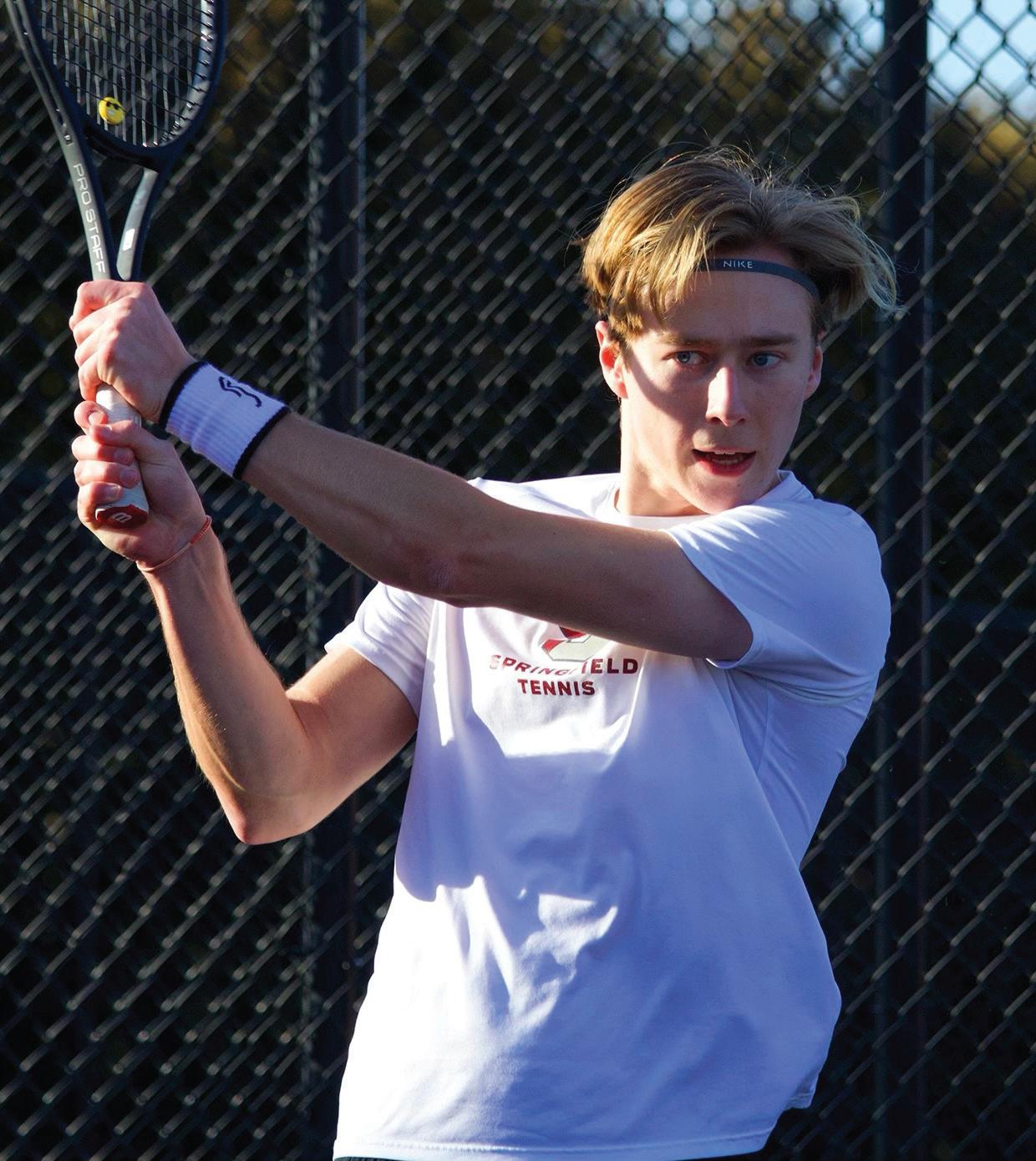
The rarity of this is
what makes it remarkable. Sweden has the reputation of being a very smart country overall, and many students choose to stay home to study at Swedish univer-
sities, meaning not many make the journey to America to further their academic experience. But just the tennis team hosts a majority of the Swedish kids on campus, and they
are all in the same year.
Nicander said, “It’s fun having those guys around, we get along really well.”
Hailing from the capital of Sweden, Stock-
“I don’t even remember when I started [playing tennis]. My dad just put me in tennis and soccer the earliest he could,” he said.
Stockholm is just over 3,800 miles away from Alden Street, but it is not a surprise to see a trio of Swedish kids playing tennis in the States. Although soccer, or football as it would be called in Sweden, is the most popular sport, Sweden has a very rich history of tennis based on the back of one man, Bjorn Borg.
Borg was the first man to take home 11 grand slam titles, winning the French Open six times and Wimbledon five times in a row, a feat that has only been matched by the great Roger Federer. However, to the people that were kids and young adults when Borg was dominating across the world, he was much more than that.
Borg was described by tennis lovers as the man who made tennis cool. His unique style, aided by his flowing light blonde hair, a symbol of Scandinavian appearance, made him a cultural icon worldwide. Off the court, his dangling
First-year Eric Nicander made the 3,800-mile to Alden Street, and has had his ups and downs adjusting to American culture.Nicander started in 13 singles matches this year. (David Kilburn/The Student) __ By Nick PaNtages @nick_pantages22
necklaces, denim jackets, flamboyant shirts, and sharp shoes gave him an aura of more than just a normal tennis player.
“He was like the GOAT of tennis. There’s a lot of good guys now, but he’s like the [first] GOAT,” Nicander said.
Nicander also has some experience with the Borg family. While playing at a tennis academy in Sweden, Nicander’s doubles partner was Leo Borg, Bjorn’s son. The pair were partners on the court for around two years, and it allowed Nicander to become familiar with Bjorn himself, even playing mini-golf with the legendary tennis player once.
“[Leo and I] played a lot. We were great friends, although I haven’t seen him in a while,” Nicander said.
Although tennis has given Nicander a way to become comfortable in his new American environment, it was not always that simple.
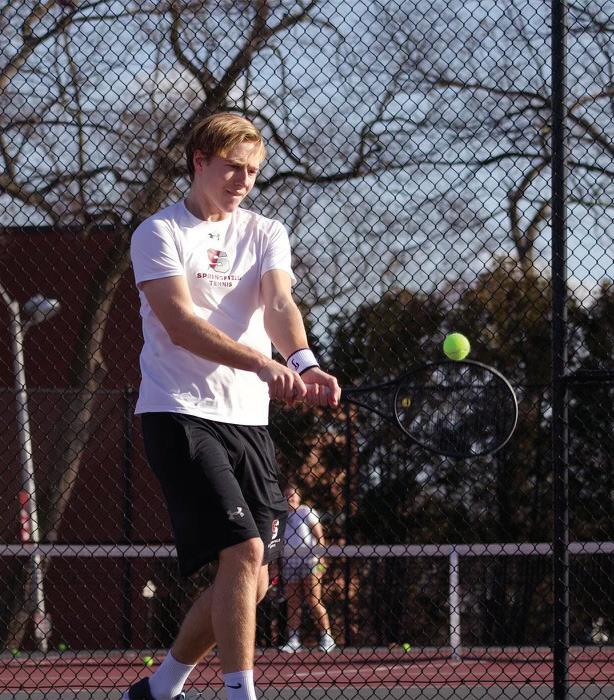
The decision to come to America was not an easy one for Nicander. He had a strong group of friends in Sweden, and they hung out all the time, maximizing their time together in Stockholm. As with most friend groups, when it came time to decide what they all wanted to do after their schooling had ended, they took different paths. Some of Nicander’s friends went to university in Sweden, others decided to travel and some got right into working. Nicander decided on something different, which was to come study in America.
“I felt like I wanted to do something unique, something that no one else did. It’s pretty cool to say you went to college in the U.S.,” Nicander said. “Plus, it looks really good if you say you have a degree from an American university.”
Due to the process of schooling and international applications, Nicander was notified of his acceptance into Springfield College in late July, a little over a month before the semester began. He had a quick decision to make, and spent a couple days pondering over whether Springfield was the right fit for him. Ultimately, he came to a decision.
“F— it why not. I’ll see what happens,” Nicander told himself, and with that, he made his decision to leave everything and Stockholm to come to Springfield, Massachusetts.
Nicander has had struggles in learning and adapting to American culture. Excluding one trip to America when he was 11 years old to visit an uncle who lives in Key West, Fla., Nicander was completely unfamiliar with American culture, which was why going to college here was so intriguing to him.
Upon arriving in America, Nicander found himself hanging out with his fellow Swedes very frequently in their first couple weeks. However, this was not what Nicander necessarily wanted.
“I love Mat and Tim, but I didn’t move to another country to hang out with Swedish kids. I have my Swedish friends at
home. I have a lot of fun hanging out with American kids. That’s what I came here to do, to learn the culture,” Nicander said.
One of the things that Nicander has struggled with the most in his adaptation process is the food. Americans have the stereotype from around the world for being notoriously poor eaters, something Nicander believes is true.
Sweden, like most European countries, emphasizes healthy, homemade
meals that you know exactly what is in it. When coming to America however, Nicander was forced to adjust.
“Everything is fried or covered in cheese,” Nicander said. “Fast food and microwaved foods too. That was like a once a month thing in Sweden if you needed a quick meal, but here, some people live off that.”
Another thing he noticed was the difference between healthy and processed foods in America.
“The healthy foods
are so expensive. It’s like they want the people to eat bad,” he said.
Although the food may be different from what he is used to, the main thing that had plagued Nicander in his new home was the language.
One of the problems for Nicander was the informal conversations, or small talk, that he struggled to understand. For example, just take
Nicander continued from Page 11
a second to think about the phrase “what’s up”. It’s a little odd how people have been using that phrase as a form of informal greeting, even though neither word in the phrase seems like it would have anything to do with that. However, with a little help from none other than the signature “What’s up Doc” greeting of Looney Tunes character Bugs Bunny, that has become the go to greeting of American people.
For Nicander, living his first full day in America after moving over 3,800 miles from home, someone asking him “what’s up” was the most embarrassing thing that could have happened.
“I got myself into some awkward situations when I first got here. We practice the formal part of the language. We don’t practice the small talk,” Nicander said.
Although he did not know how to respond to “what’s up,” Nicander is well-versed in English. Growing up in Stockholm, Nicander started the schooling system when he was six years old, and learned English every single year.
The other part of the language that plagued Nicander was his self-expression and humor. Although Sweden is mostly known internationally as a quiet and reserved country, Nicander takes none of that with him.
“Sweden is an awkward country. People don’t talk to strangers,”
bother him.
“People automatically think that you are weird [because you are foreign]. But that’s fine. Because that means I’m not interested anyway.”
He added, “If people got to know the real me, it would be so much different.”
There was one person who helped Nicander through this and made him feel comfortable, which was his roommate, Nick Rogers.
Rogers is a fellow first-year student who is a member of the wrestling team, and coming from Watertown, N.Y., he did not know much about Nicander before getting to Springfield, and was quite nervous about the concept of rooming with an international student he had never met before.
Rogers said.
Nicander also feels more comfortable now that he has spent over half a year in America.
“I feel confident in the language now,” he said.
Another thing for Rogers has been learning Swedish culture. Nicander may have come here to learn American culture, but naturally Rogers is just as interested in different cultures as Nicander is.
Nicander said.
Nicander’s roommate, Nick Rogers added, “He will talk to anyone.”
Nicander’s humor is the main thing that he has struggled with since coming to America. Although many around him viewed him as very funny, it did not feel that way to him.
“It was hard in the beginning to express my full character. It’s hard being funny in a new language.”
Coming in with the notion that Americans were talkative and friendly, Nicander still believes that is true. But there have been times where he felt he got the short end of the stick because he wasn’t born in America. However, the admittedly-self-confident Nicander doesn’t let that
“I looked him up on YouTube and saw he played tennis. That is just not a normal person I’d hang out with [in America]”, Rogers said.
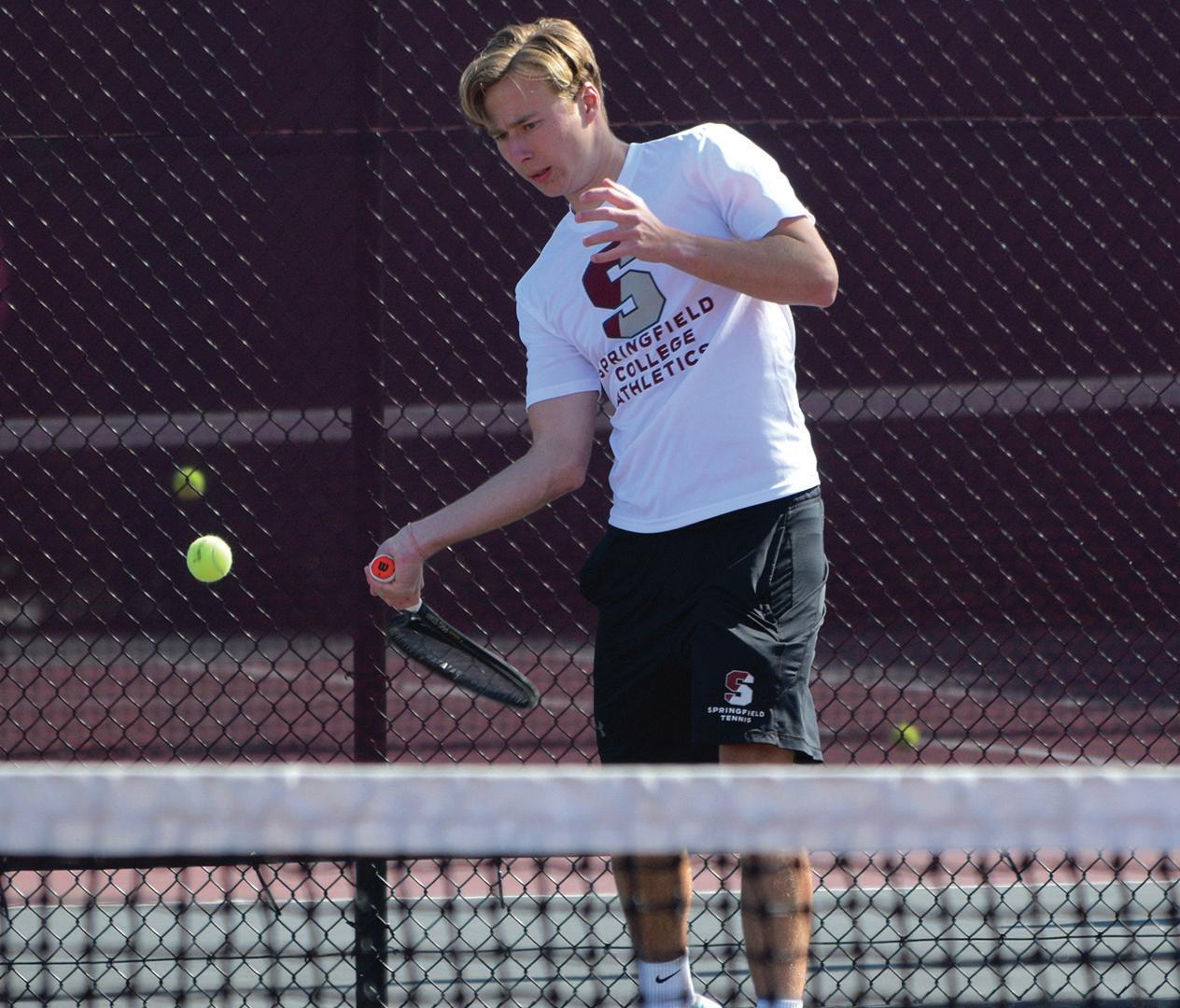
Despite not knowing what to expect, Rogers is incredibly grateful for how good their relationship is.
“He’s awesome. I hang out with him every day now.”
The most important thing to Nicander however is how much Rogers helped him in understanding the language parts of America that he was uncomfortable with.
“I don’t even know how I helped him. It just came naturally through conversation,” Rogers said.
Nicander’s improvement is unmistakable.
“He’s come a long way since we first met,”
Something the pair of roommates have to bond over is sports, as most people at Springfield have love for at least one sport. Coming to America, Nicander loved soccer, or football as it is referred to in Sweden, and tennis, which he plays here. However for Rogers, soccer just does not have the impact in America as it does around the world.
“He would just rant over soccer and how boring it was and how no one should ever play it,” Nicander said.
Fast forward to April, and now the two have another thing to bond over. FIFA 23, the soccer video game, is something that Nicander and Rogers always play together.
“He’s taught me so much about soccer,” Rogers said. “He still smokes me in FIFA, though.”
The pair’s relationship has gone so far that Rogers is planning a trip out to Stockholm this summer to visit Nicander, a fitting showing of how fast the pair of roommates have grown to be great friends.
13, but he was spiked with the heart of a competitor. After just an amuse-bouche of what hard work paying off in track feels like, Dole went on to shatter his school’s sprint records the next year in the 100-meter and 200-meter dashes.
“I know what it feels like coming first. It tastes good,” he said “And then that last year, I had that last shot, I broke the 100 record, and I broke the 200 record.”
As the springtime sun shined down on Blake Track, the Springfield College track and field team was consumed with positive energy. The warm-up lines of dedicated athletes – in sync as they walk through their routine ritual of dynamic and static stretches, shoulder-to-shoulder – were like soldiers marching into battle. At the center of it all was Anik Dole, encasing his teammates in his contagious positivity.
At 5-foot-4, Dole is the shortest sprinter on the team. Despite this, the junior Business Management major possesses one of the biggest hearts – and biggest personalities – among his teammates. His journey throughout athletics brought him from Oman, to Dubai, then halfway across the globe to Springfield.
That journey is one of an enduring sense of resiliency, passion and grit.
Dole was born in Oman, which is located on the southeastern coast of the Arabian Peninsula, in western Asia, He and his family then moved to Dubai when he was 13. “My childhood was in Oman. I had my goats, my everything,” Dole said. “That’s where I became an athlete and found my passion for track and field.”
Dole began competing in track and field competitions at 8 years old. “I came dead last in every race,” he said.
His first role model in track was his first head coach, Barakat Al Harthi.
“My first coach was an Olympic coach,” he said. “He competed in Tokyo in 2020 and Rio in 2016.”
Early on during his
track career, Dole would travel an hour from home, in order to work with Harthi. When Dole was 13, just before moving from Oman to Dubai, his career on the track took a long jump. In his last competition with his school in Oman, Dole “popped off” against his peers.
“I went from coming dead last to not even coming third or second, I came first,” he said. To this day, Dole doesn’t know for sure what clicked in him. “It [was] probably puberty,” he said. ”I asked my parents, ‘Did you put something in my drink? Was I drugged?’ My PE teacher asked me that question, my friends asked me. … as much as they were shocked, I was shocked.”
Of course, Dole wasn’t actually spiked with a mystery super serum at age
he’s also very outgoing if you get to know him.”
Dole got off to a blistering start for the Pride in 2021, during his freshman year. His personal best in the 100-meter that year leveled at 10.84 at the NEWMAC 100-meter preliminary races. Later that day, he went on to win the 100-meter conference title, with a time of 10.91.
Dole chased that winning feeling to the other side of the planet, where he followed his passion to Alden Street. Fast forward to age 20, when Dole found himself thriving at the collegiate level. He found the pinnacle of his success as the second leg of the 2021 All-American fourby-100 meter relay team. Dole cemented himself in Springfield College history by breaking the previous school record.
His mother, Samantha Tania Dole, said it was hard for her to let her son pursue his dreams. “At first it was a very difficult decision: the prospect of sending your only child away from home to another continent was heartbreaking,” she said via email. “But we put Anik’s future first, and put our selfish reasons aside… We knew he would do well in track in the U.S., so we encouraged him wholeheartedly to pursue his dream of studying in the U.S.”
Upon his arrival at Springfield College, Dole had zero issues assimilating within his newfound surroundings.
“My first thoughts of Anik were ‘This kid is very quiet and shy,’ which makes sense in hindsight. He [had] never been to this country in his life,” said junior Seth Regan, one of Dole’s roommates and closest teammates. “But
Hot off of a NEWMAC title, Dole and his teammates kept the gears churning on the track. In the spring of the following year in 2022, Dole and his 4x100 teammates earned a bid to compete at the DIII NCAA Championships at the Spire Institute in Ohio.
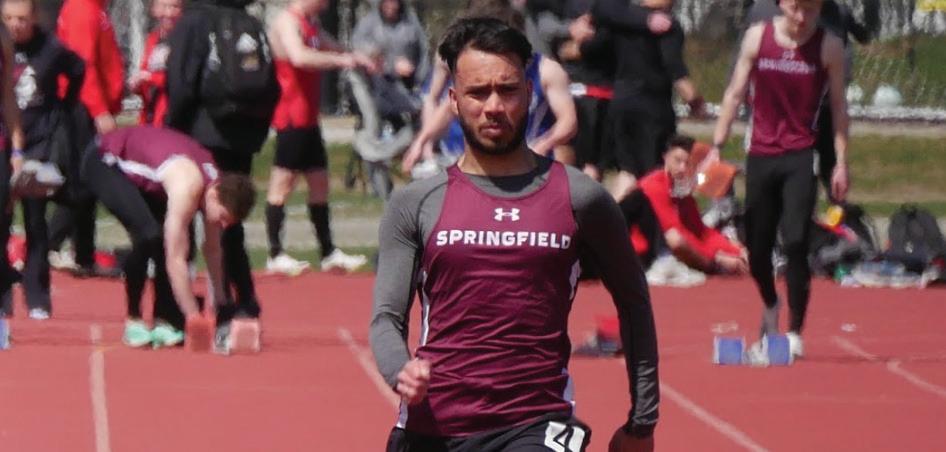
“Evan [Weber] was the first leg, I was the second leg, Mike [Scott] was the third, and Tyler [Hansen] was the fourth leg,” Dole said. “So that’s what brought us together, going to nationals for the same purpose. But all four of us have had a different journey to get there… We also knew this is the time to just live in the moment, and not to overthink everything.”
The night prior to their record-breaking preliminary run at the national meet, Dole said, “We were up talking. ‘All right, tomorrow’s the day we run at Nationals. So we either make it or we don’t make it. We got to put everything we got on the line.”
Scott described the magnitude of Dole’s influence on the team. “He might be hurting, there might be some other stuff going on in his head, but he was still smiling, like he was making sure everybody else was having a good time, he doesn’t take any of his negative emotions out on anybody else,” Scott said. “He’s always pushing people and being there for people, being a quality presence at all times.”
Springfield sprinter Anik Dole grew up in Oman and Dubai, and despite his small stature, he has made a large impact.Anik Dole running at the Springfield College Classic. (Photo courtesy of Springfield College Athletics)
In the early stages of a rainy Saturday afternoon doubleheader this past weekend, Springfield College first-year softball player Amelia DeRosa notched a oneout double. However, this wasn’t your average extra-base hit – because it broke Springfield’s single season record. It is certainly an impressive feat, but it’s one
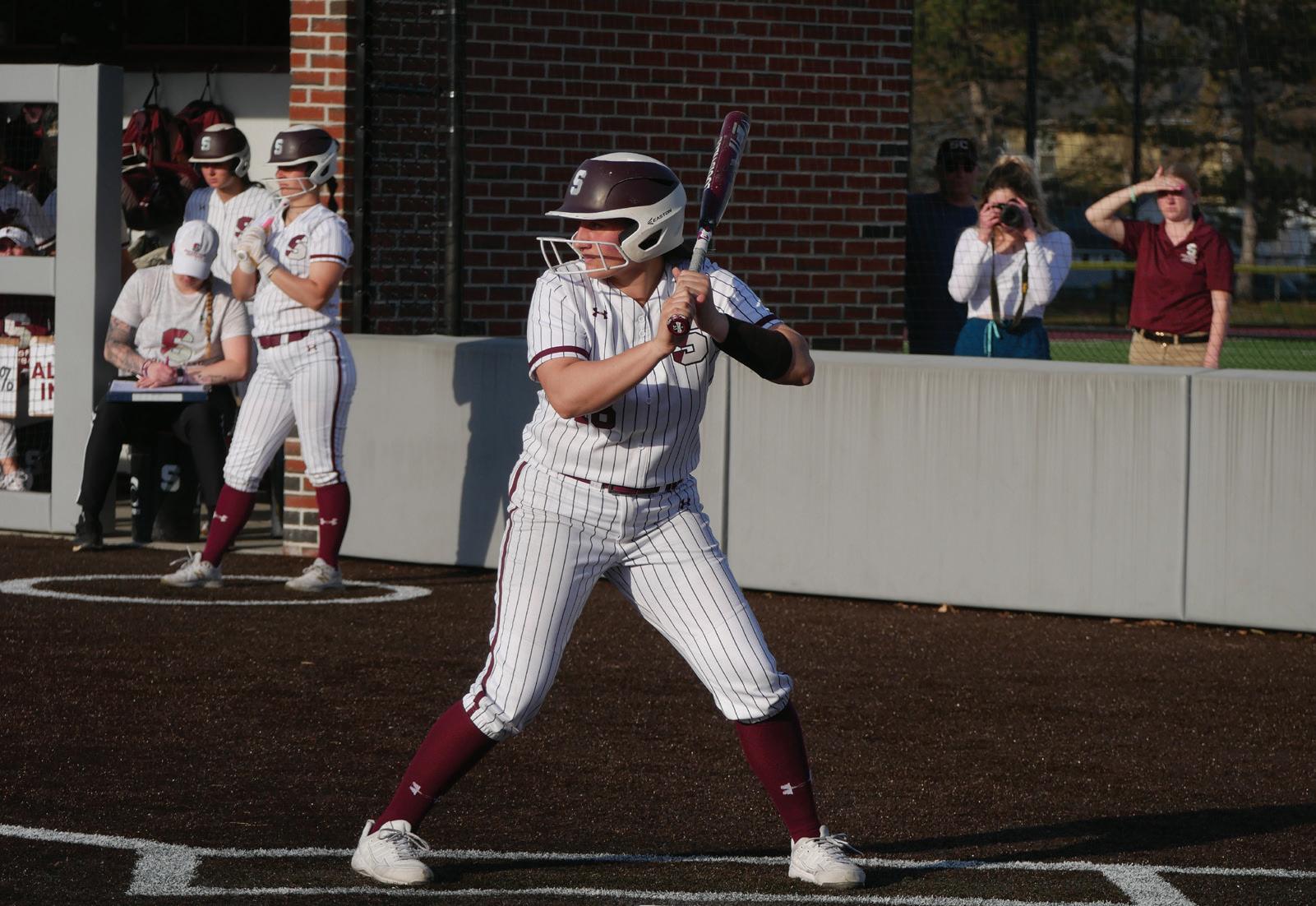
because I’ve worked my whole life, playing softball since I was five years old with my dad,” DeRosa said. “I didn’t expect this much to happen, but it feels like all my hard work paid off.”
Her father, Michael DeRosa, has been a mix of a teacher, motivator and fan of DeRosa’s since she first started playing softball. The experiences with her father, a former college baseball player, stand out to her.
to someone else: her father.
He was skeptical of Amelia’s desire to play softball, and wasn’t sure it would work out. When she was looking to get hitting instructions, he even told her to go back inside and “play with her Barbies.”
__ By Tucker PaqueTTe __ @tpaquette17that would likely earn even more fanfare if it was anyone else who accomplished it.
That’s because it is quite possibly the third most impressive achievement of DeRosa’s season this year, as she has also hit for the cycle and thrown a perfect game.
If that sounds insane, it’s because it is. DeR-
osa has played at a skyhigh level this year. As of May 2, DeRosa held a .507 batting average at the plate, alongside a 2.33 ERA from her outings on the mound. Admittedly, DeRosa has been taken aback by the success she has found so early in her collegiate career.
“It’s been really surprising and rewarding
“He taught me everything he learned and he taught me from his mistakes,” DeRosa said. “He’s been with me the whole way. He made me mentally tougher, pushed me to my limits, and was also very nurturing.”
“He’s always there, supporting me, texting me before games, trying to come to as many as he can,” DeRosa added.
But long before it was time for DeRosa to prove herself to collegiate coaches, she had to prove herself
As it would turn out, though, one day spent practicing on the batting tee would completely alter her father’s view of Amelia’s current abilities and future potential.
On this day, Amelia brought out the tee and swung right-handed with a lovely swing, which caught Michael’s attention.
However, when Amelia did the same swing from the left side, a “compact” cut, as her father would describe it, the depth of her skill set truly struck him for the first time.
“I’m like, ‘that’s it, I’m in,’” he said.
As Amelia continued to progress, there were more indicators
Before she became a two-way star for the Springfield softball team, Amelia DeRosa she had to prove herself to a tougher opponent: her dad.DeRosa leads the Pride in hits, doubles and RBI. (Photo courtesy of Springfield College Athletics)
that she had a bright future ahead of her. One of them was how she didn’t play against the typical competition.
“When [Amelia] was young, she almost never played with anybody her age,” Michael said.
Michael always challenged Amelia to play up (meaning against older kids), and the first time she did so, she was 11 years old and played with 15 and 16-year-
olds. She ended up playing on the high school JV team in 7th grade and was a key contributor on that team.
As Amelia racks up the accomplishments and the Pride racks up the wins, her father believes her mindset and character are just as present as her on-field prowess.
“She doesn’t have much of an ego at all,” Michael said. “I’m sure
Amelia’s leadership skills are not a new development this year, however. Michael returns to his daughter’s senior year in high school, referring to it as her “give back year” with how she treated her teammates.
“She took them all under her wing, and she made these kids believe in themselves and realize that they absolutely belong,” he said.
DeRosa is prepared to pass along additional softball-related wisdom, as she is beginning to get into coaching, and trying to help other players. Her father is pleased with this, too.
“You’ve got to pay it forward, and that’s the next thing I’m starting to see from her,” Michael said.
is making her mark on the diamond also brings ample joy to her father. He is grateful to have played a part in her reaching this point.
“There was nothing more important to me than being able to be out there with her and share that time with her, and be able to teach her,” Michael said.
DeRosa gives credit to the coaches she’s had along the way, in addition to her father, for getting her ready for her moment at Springfield College.
with all the accolades [that she has earned], she would give up every single one of them for a NEWMAC championship, and the opportunity to pass it along to a young girl [who] loves this game.”
“She isn’t thinking about breaking records,” said Springfield College’s head softball coach Kate Bowen. “She just wants to win for the team.”

Moments and memories like these serve as a form of validation for Michael, as it shows him all his work to help Amelia be a quality person and teammate is paying off.
“Her success on the softball field isn’t what was [most] important to me,” he said. “I wanted to bring up a strong and independent young lady, and that’s what she’s become. The vehicle in which we did that was through softball. What you see on the field is the person she is off the field.”
The fact that DeRosa
“I’ve been really fortunate [because] all the coaches I’ve had have prepared me perfectly for this,” DeRosa said. “My dad pushed me and taught me, my pitching coaches for my teams pushed me and taught me, and helped me.”
While she enjoys racking up the records, DeRosa maintains a selfless, team-oriented approach to the game she loves. This attitude, along with her play, endears her to her teammates, coaches and, of course, her father.
“I play to be a part of a team, it’s like a family, and I’ve found that here,” DeRosa said. “When I get on the field, I just want to go to war with my teammates and play as hard as I possibly can.”
Softball player Amelia DeRosa has excelled as a hitter and pitcher in her first year with the Pride.

[See page 14]
